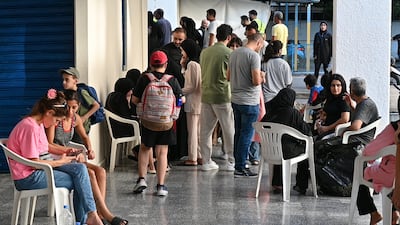The escalation of Israeli strikes on Lebanon since September 23 has inflicted heavy damage on the country, with the death toll rising quickly.
The effects of the violence highlight the intensity of Israeli operations on its northern border. It comes after Israeli Defence Minister Yoav Gallant said the country had shifted its focus to a “new phase” of the conflict.
Casualties and injuries
As of late September, more than 630 people have been killed in Lebanon, including 50 children and 94 women, with more than 1,700 injured, according to figures from the Health Ministry and the UN Office for the Co-ordination of Humanitarian Affairs. This makes September the deadliest month of any Israeli war on Lebanon.

Displacement crisis
Lebanon, with a population of 5.8 million, is home to 1.5 million refugees, primarily Palestinians and Syrians. The conflict has worsened the displacement crisis, with 500,000 forced to flee their homes by the Israeli bombardment, according to estimates from the Lebanese government. That means about 8 per cent of the population was displaced in a matter of days.
More than 60,000 Israelis have been displaced since Hezbollah began its cross-border attacks after the start of the Gaza war, official figures show.

Strikes and cross-border attacks
The Armed Conflict Location and Event Data project found that, between October 7 and September 20, at least 10,214 cross-border attacks occurred between Israel, Hezbollah and other armed groups in Lebanon. The majority were concentrated at Lebanon's border with Israel.
In the past few days, Israel has conducted about 2,000 strikes on what it says are Hezbollah positions and weapons stores. In return, Hezbollah has launched about 250 attacks, with some rockets reaching Tel Aviv on Wednesday.
Israeli firepower, including artillery, air strikes and drone attacks, has accounted for more than 85 per cent of the cross-border strikes since October 7.
Pager and walkie-talkie attacks
Blasts involving pagers belonging to Hezbollah members killed 32 people, including two children, and injured thousands on September 17. A day later, 20 were killed and 450 injured when walkie-talkies exploded, the Lebanese Health Ministry said.
Lebanese authorities blame Israel for the blasts, but the country has not taken responsibility. Israeli sources claimed 1,500 Hezbollah fighters had been incapacitated during the latest escalation.
Economic impact and aid
Lebanon’s fragile economy is set to worsen, with a contraction of between 10 per cent to 25 per cent predicted this year, as key sectors including agriculture and tourism are hit. Damage to vital infrastructure, including water stations, will deepen the crisis.
The UN announced that humanitarian organisations urgently need $170 million to sustain their response and meet new needs in Lebanon. The World Food Programme has food supplies for 150,000 people for five days. The UN children's agency has 25 tonnes of medical supplies set to arrive in Lebanon, with another 53 tonnes on the way.
Past Israeli invasions of Lebanon
Israel has invaded Lebanon on three occasions, with the first two coming in conflicts with the Palestine Liberation Organisation.
- 1978: Israel aimed to displace the PLO from southern Lebanon. The operation led to between 1,100 and 2,000 deaths, mainly civilians.
- 1982: Israel’s largest invasion resulted in the deaths of 20,000 people, including civilians, and the expulsion of PLO forces.
- 2006: Caused by the capture of two Israeli soldiers by Hezbollah. The 34-day conflict resulted in 1,191 Lebanese deaths, including civilians.
In the current escalation, Israel claims it is attacking Hezbollah positions and fighters, but civilian casualties are at an all-time high. Strikes this month, including on September 23, surpass the highest single-day death tolls from previous conflicts.
Wars such as the 1982 invasion of Lebanon caused thousands of civilian deaths in a few months. But the concentrated casualty figures recorded in the latest violence are unprecedented in the country, demonstrating the intensity of the conflict.
What next?
Lebanon faces a deepening humanitarian crisis amid increasing displacement and further damage to critical infrastructure. The US, France and several Arab countries have called for a 21-day ceasefire, a move Israeli Prime Minister Benjamin Netanyahu has rejected.
The violence threatens not only Lebanon’s economic stability, but also the safety and future of its people.


